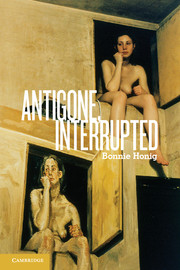Book contents
- Frontmatter
- Contents
- Preface
- Acknowledgments
- Introduction
- Part I Interruption
- Part II Conspiracy
- 4 Mourning, membership, and the politics of exception: plotting Creon's conspiracy with democracy
- 5 From lamentation to logos: Antigone’s conspiracy with language
- 6 Sacrifice, sorority, integrity: Antigone's conspiracy with Ismene
- Conclusion
- About the Cover Image
- Notes
- Bibliography
- Index
4 - Mourning, membership, and the politics of exception: plotting Creon's conspiracy with democracy
Published online by Cambridge University Press: 05 May 2013
- Frontmatter
- Contents
- Preface
- Acknowledgments
- Introduction
- Part I Interruption
- Part II Conspiracy
- 4 Mourning, membership, and the politics of exception: plotting Creon's conspiracy with democracy
- 5 From lamentation to logos: Antigone’s conspiracy with language
- 6 Sacrifice, sorority, integrity: Antigone's conspiracy with Ismene
- Conclusion
- About the Cover Image
- Notes
- Bibliography
- Index
Summary
[I]n a curious way, to focus upon the disobedient and the process of disobedience is to accept the perspective of the established order. It is a concession that it is the [wo]man who appeals beyond law that is in need of explanation.
Robert CoverThe task that remains to me then is to outline an authentically conflictual reading of tragedy, one that upholds both poles at the same time, the politics that prescribes forgetting and the mourning that regenerates memory.
Nicole LorauxPolitics is not made up of power relationships; it is made up of relationships between worlds.
Jacques RancièreTurning now from Part I's focus on the politics of lamentation to look in detail in Part II at the politics of lamentation, I begin by setting Sophocles’ Antigone in the context of fifth-century burial politics in Athens. Approaching the play in this context we find not a mortalist humanist Antigone but rather a partisan political actor. I read Antigone's burial of her brother, Polynices, (but also other actions of hers) as a performance of elite objections to the classical city's emergent democracy. Creon, on this reading, represents not sovereignty or the rule of law run amok, or not just that, but also and more pointedly a different elite tactic: he conspires with the new democracy and adopts many of its causes as his own. He is one of “the newer breed of elites who,” Mark Griffith argues, “are willing to work within the democratic system and to shape their own claims and choices to conform with what is ‘good for the city’” (2010: 123).
- Type
- Chapter
- Information
- Antigone, Interrupted , pp. 95 - 120Publisher: Cambridge University PressPrint publication year: 2013

